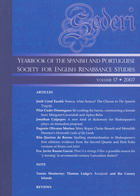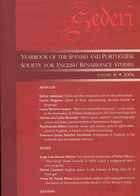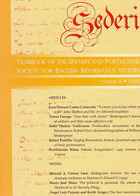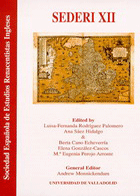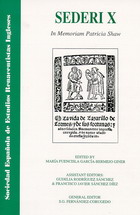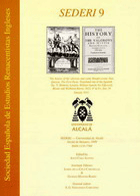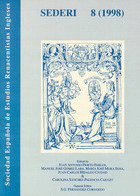| Kiss, Attila. «The Body Semiotic in the Theatre» |
13-23 |
|
| Homem, Rui Carvalho. «Fleshly Voyages: Ben Jonson, Space and the Body» |
25-41 |
|
| Cano Echeverría, Berta y María Eugenia Perojo Arronte. «‘A Medicine of Cheries’: The Language of Profit in Sydney’s Defence of Poesie» |
43-48 |
|
| Casanova, Jorge. «Crashaw and the Emblem Revisited» |
49-56 |
|
| Domínguez Romero, Elena. «‘By Cruell Love Now Slaine’: Virgilian Structures and Themes in England’s Helicon» |
59-65 |
|
| Figueroa Dorrego, Jorge. «Wroth and Weamys: Two Different Approaches to Pastoral Romance, Love, and Gender» |
67-73 |
|
| Sáez Hidalgo, Ana. «The Spanish Connection of The Anatomy of Melancholy» |
75-89 |
|
| Zunino Garrido, Cinta. «Mycetes’ Rhetorical Failure in Christopher Marlowe’s Tamburlaine The Great» |
91-97 |
|
| Parker, Patricia. «What’s in a Name: And More» |
101-149 |
|
| Álvarez Faedo, María José. «Orson Welles’s Gothic Cinematic Approach to Shakespeare’sMacbeth» |
151-159 |
|
| Barneto Alanís, Alfonso. «‘Momentary grace’: the Platonic Undertones of Hastings’ Prophecy in Richard III» |
161-168 |
|
| Dawson, Janet. «Order and Disorder in Two Versions of Troilus and Cressida: The Case of Ulysses» |
169-177 |
|
| González Campos, Miguel Ángel. «“Had I/ not four or five women once that tended me?”: Paul Mazursky’s Version of Shakespeare’s Tempest» |
179-184 |
|
| Martínez, Zenón Luis. «True Looking-glasses: Narcissism and Motherhood in Shakespeare’s Sonnets» |
185-194 |
|
| Machado, María Salomé. «Defying Convention: the Verbalization of Eroticism in W. Shakespeare’s Othello and J. Donne’s Elegie XIX» |
195-202 |
|
| García-Bermejo Giner, María F. «The Language in Mary Rowlandson’s 1682 Captivity Narrative» |
205-215 |
|
| Gómez Lara, Manuel J. «Trotting to the Waters: Seventeenth Century Spas as Cultural Landscapes» |
219-239 |
|
| Arreciado Charlo, Victoria. «The Decline of the Monarch’s Prerogative: Banks and his Imitators» |
241-245 |
|
| Calero del Valle, María José. «The Ravished Heroine in Restoration Tragedy: Ibrahim the Thirteenth Emperor of the Turks and The Conquest of Spain» |
247-253 |
|
| Domínguez García, Beatriz. «The Search for Female Power in Catharine Trotter’s Agnes de Castro» |
255-261 |
|
| Meira Sierras, Adelaide. «Towards a Female Identity» |
263-270 |
|
| Pérez Vides, Auxiliadora. «Gender, Disguise and the Politics of Marriage in Ariadne’s She Ventures and He Wins» |
271-276 |
|
| Vélez Núñez, Rafael. «Transformations of courtly entertainments: Restoration odes» |
277-283 |
|
| Villegas López, Sonia. «Catharine Trotter’s Agnes de Castro, or the Revision of Female Virtue» |
285-290 |
|
| Álvarez Recio, Leticia. «An Approach to English Anti-Catholicism Through the Analysis of Some 17th Century Anti-Jesuitical Pamphlets» |
293-300 |
|
| Bromber, Robert. «Abandonados and Afortunados: The Prosecution of Corsarios by the Mexican Inquisition» |
301-311 |
|
| Carrillo Linares, María José. «The Days of the Moon: Science, Magic or Poetry?» |
313-318 |
|
| Curbet, Joan. «Dogma and the Limits of Heteroglossia in Sir Thomas More’s Dialogue Concerning Heresies (1528)» |
319-329 |
|
| Monnickendam, Andrew. «The Un-Merry Laws: Marriage, Widows and Adultery in Two 1656 Tracts» |
331-341 |
|
| Whitlock, Keith. «Folklore: opiate of the people or the social cement of middle England?» |
343-355 |
|
